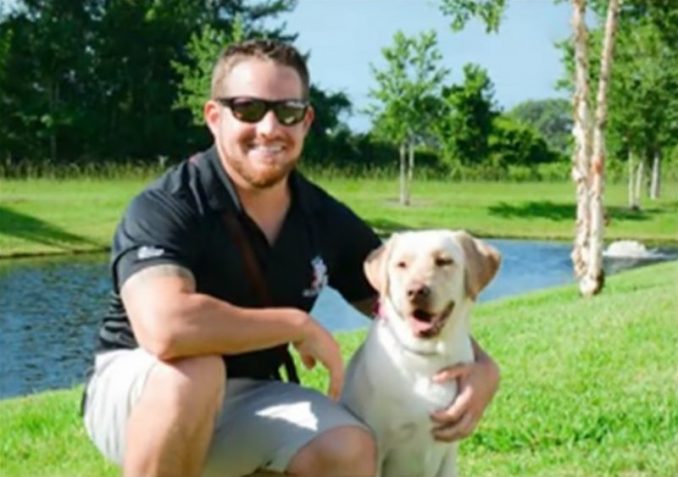
After serving as a Marine for 10 years and earning a purple heart, a veteran returned home and got a job. When his supervisor saw what he had brought with him, however, he was told to go home. After the company threatened to fire him, the public was so angry, many began to call for a boycott.

Yauncey Long is a veteran who served in Iraq and Afghanistan, working counterintelligence for the Marine Corps. After being wounded in combat and earning a Purple Heart, Long returned home, proud of his service but also suffering from Post-Traumatic Stress Disorder.
Luckily, Long found the perfect treatment for his PTSD. After trying medications to manage his symptoms, he discovered that the biggest help in dealing with his condition was the assistance of a service dog, who he named “C4.” Unfortunately, after receiving the dog from an organization which helps wounded warriors get needed service dogs, his employer would not let him bring the canine to work with him.

Although Long has become less dependent on medication for his PTSD and has been able to do things he was unable to do for a long time before getting C4, Cincinnati Bell, the Midwest telecom company where Long was employed, told him to go home when he showed up for work with his service canine, not allowing the dog at the worksite. Even after applying for reasonable accommodations, Long claims he only continued to get pushback from the company, including “unsatisfactory” responses from management.
Long explained to his employer that the service dog helps him function normally, but the veteran was told that if he continued to bring the dog to work, he would be fired. Believing their actions were inappropriate and discriminatory, Long continued to arrive at work for his scheduled shifts with C4 anyway. Each time, he was sent home without pay. Undeterred, he continued to show up every day, but each time, he received the same response from his boss.

According to Long, the company is treating C4 as though the dog is an “option” rather than a necessity to treat his condition. “The dog is really helping with my symptoms,” Long told Fox News, adding that C4 helped him to be able to go grocery shopping independently for the first time since returning from his deployment.
When Fox News reached out to the company for a statement, Cincinnati Bell alleged that the company had not received any information about Long’s condition or its “effect on the ability to perform his job.” However, the veteran says that’s simply not true.

“It’s just a stonewall,” Long said, adding that he has filed all of the necessary documentation to prove his PTSD and his need for C4 to be able to accompany him to work, and he even forwarded the news outlet copies of letters sent to him by the company telling him that they received his paperwork and would begin processing it. Long added that he has not received any requests for further documentation, which he would be happy to provide if someone would just tell him what, if anything, he’s missing.
Long thinks it’s possible that his paperwork has been ignored because the company doesn’t know how to process it since it may be the first request of its kind that they have received. Rather than deal with making a policy, they are brushing it off, he believes. With this in mind, Long wrote to Leigh Fox, the CEO of Cincinnati Bell, to explain the problem, hoping to receive some help. Instead, he was simply told to speak to human resources — something he had already done repeatedly to no avail.
Veterans have a tough enough time returning to civilian life after deployment, especially one that left them wounded in combat. It seems Yauncey Long is just trying to earn an honest living after seeing things most of us can’t even imagine while serving his country and ensuring our freedoms.
It’s a shame he’s not receiving the respect and accommodations he needs from his employer so that he can be a contributing member of society after becoming disabled during service. So, it’s no wonder there were plenty of readers who were left agitated and demanding a boycott of the company.

However, there were those who surprisingly strongly disagreed with the Purple Heart recipient. Stating that they felt a company should be able to decide their own rules for running their business, even when it comes to service dogs, they didn’t feel his employer should be forced to allow the dog to come to work with him.
Sadly, that line of thinking could easily leave guys like Yauncey Long unemployed indefinitely, dependent on taxpayers to provide for him, which doesn’t sound like a very viable solution either. There’s got to be a compromise somewhere. Is allowing a wounded veteran the company of his service animal really all that bad for a business? You decide and tell us what you think.




The believed he was qualified and hired him. There was no mention he couldn’t do the work. They just didn’t like his service dog. They also lied about him saying he never informed them of his disability or that the dog was a service animal.
Would the company have done the same thing to a person with a seeing eye dog? How about if he needed a wheelchair? Or needed supplemental oxygen?